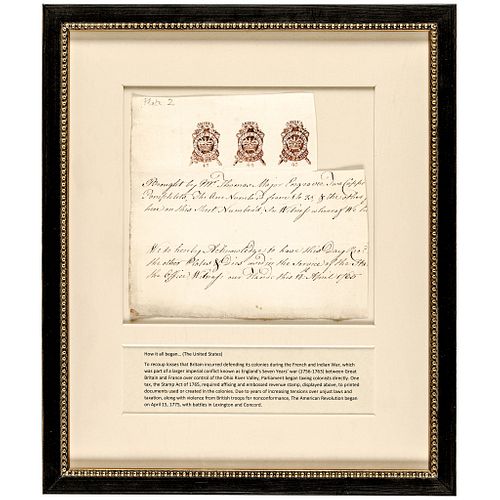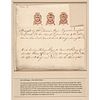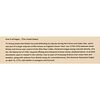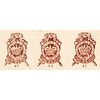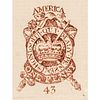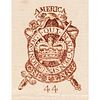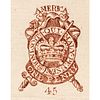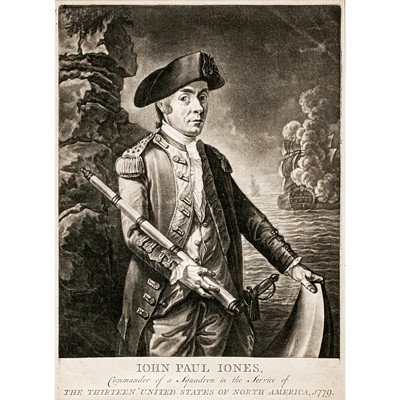UNIQUE 1765 Strip of Three Proof British Revenue Newspaper Tax Stamps Scott RM19
Lot 60
Categories
Estimate:
$4,000 - $6,000
Absentee vs Live bid
Two ways to bid:
- Leave a max absentee bid and the platform will bid on your behalf up to your maximum bid during the live auction.
- Bid live during the auction and your bids will be submitted real-time to the auctioneer.
Bid Increments
| Price | Bid Increment |
|---|---|
| $0 | $10 |
| $200 | $20 |
| $300 | $25 |
| $500 | $50 |
| $1,000 | $100 |
| $2,000 | $200 |
| $3,000 | $250 |
| $5,000 | $500 |
| $10,000 | $1,000 |
| $20,000 | $2,000 |
| $30,000 | $2,500 |
| $50,000 | $5,000 |
| $100,000 | $10,000 |
| $200,000 | $20,000 |
| $300,000 | $25,000 |
| $500,000 | $50,000 |
About Auction
By Early American History Auctions
Jan 23, 2021
Set Reminder
2021-01-23 12:00:00
2021-01-23 12:00:00
America/New_York
Bidsquare
Bidsquare : Early American History Auction of Autographs, Americana, Political & Maps
https://www.bidsquare.com/auctions/early-american-history-auctions/early-american-history-auction-of-autographs-americana-political-maps-6311
311 Lots of Rare, Historic Autographs, Americana, Civil War Era, George Washington, Abraham Lincoln, Slavery & Black History, Revolutionary War Era, Colonial America, Federal Period, War of 1812, Colonial Currency, Indian Peace Medals & more... Early American History Auctions auctions@earlyamerican.com
311 Lots of Rare, Historic Autographs, Americana, Civil War Era, George Washington, Abraham Lincoln, Slavery & Black History, Revolutionary War Era, Colonial America, Federal Period, War of 1812, Colonial Currency, Indian Peace Medals & more... Early American History Auctions auctions@earlyamerican.com
- Lot Description
Colonial America
Exceptional UNIQUE Strip of Three Proof British Revenue Tax Stamps for use in Colonial America Scott No. RM 19
UNIQUE Strip of Three 18th April 1765 "Stamp Act" Proof Impression British Revenue Newspaper Tax Stamps for use in Colonial America, Scott Catalog Number RM 19, Plate 2, Red-Brown, Dies 43, 44, and 45, Framed, Choice Proof Near Mint.
Formerly sold as Lot 129 in Spink's April 30, 2018 Auction, where it was described as follows:
"[Scott] #RM 19, British Revenues for Use in America, 1765 "Stamp Act" Newspapers 1d Red brown, Dies 43-44-45, Strip of Three from the original Proof Sheet of 25 stamps for plate no. 2, with partial registration certificate inscription in ink at bottom dated 18th April 1765, folds not affecting the designs.
Three different denominations were issued for Newspaper and Almanac Tax Stamps. These Stamps were issued as a result of Stamp Act 1765 to contribute towards the costs of defending the American Colonies from the French. Only 200 One penny Proof stamps were printed, with die numbers from 1 to 200, printed from eight different plates, each containing 25 units. Apart from a partial proof sheet of 26 stamps in the British Museum, nine 1p examples have been recorded, including three singles, a pair and the present strip of three, of which seven are in private hands as the Smithsonian Postal Museum possesses the pair.
This recently discovered strip of three Proof Tax Stamps is believed to be the only example to exist outside the British Museum that shows both manuscript text, and the 1765 date, as well as the largest multiple of Tax Stamps recorded. It is of importance philatelically, and in the context of colonial American history and American Revolution."
Beneath the three Proofs is some manuscript text, some of which has been cut off on the right side. What can be seen reads thusly:
"Brought by Mr. Thomas Major Engraver Two Coppe
Pamphlets, The One Number'd from 1 to 25, & the other f
here on this sheet Number'd, In Witness whereof We ha
We do hereby Acknowledge to have this Day Rec'd
the other Plates & Dies used in the service of the St
the Office, Witness our Hands this 18th April 1765"
The hated "Stamp Act" taxes being a major irritation to the colonists, leading towards the American Revolutionary War. The Massachusetts Assembly suggested a meeting of all the colonies to work for the repeal of the Stamp Act. All but four colonies were represented. The "Stamp Act Congress" passed a "Declaration of Rights and Grievances," which claimed that American colonists were equal to all other British citizens, protested taxation without representation, and stated that, without colonial representation, Parliament could not tax colonists.
A small strip of text is displayed below the stamps in a separate opening in the mat: "How it all began... (The United States). To recoup losses that Britain incurred defending its colonies during the French and Indian War, which was part of a larger imperial conflict known as England's Seven Years' war (1756-1763) between Great Britain and France over control of the Ohio River Valley, Parliament began taxing colonists directly. One tax, the Stamp Act of 1765, required affixing and [sic] Embossed Revenue Stamp displayed above, to printed documents used or created in the colonies. Due to years of increasing tensions over unjust laws and taxation, along with violence from British troops for nonconformance, The American Revolution began on April 15, 1775 with battles in Lexington and Concord.
Our current consignor certainly got quite a bargain at the Spink sale, as this lot realized only $4,250. That was truly an astute purchase and a great bargain in our minds due to its significant importance in American Colonial history. Subsequent to his purchase at auction, the new owner (our current consignor) engaged a professional framer to create an impressive display and to protect the Tax Stamps under special UV-Protection "Museum Glass" and professionally framed for display. We anticipate that the rarity and great historical importance of this item will receive greater consideration from collectors in this current auction venue.
The Stamp Act was the British Parliament's first direct tax on the American colonies. This Act, like those passed in 1764, was enacted to raise money for Britain. It taxed newspapers, almanacs, pamphlets, broadsides, legal documents, dice, and playing cards. Issued by Britain, the stamps were affixed to documents or packages to show that the tax had been paid.
Organized Colonial Protests, American colonists responded to Parliament's Acts with organized protest. Throughout the colonies, a network of secret organizations known as the Sons of Liberty was created, aimed at intimidating the stamp agents who collected Parliament's taxes. Before the Stamp Act could even take effect, all the appointed stamp agents in the colonies had resigned. The Massachusetts Assembly suggested a meeting of all the colonies to work for the repeal of the Stamp Act. All but four colonies were represented.
The Stamp Act Congress passed a "Declaration of Rights and Grievances," which claimed that American colonists were equal to all other British citizens, protested taxation without representation, and stated that, without colonial representation in Parliament, Parliament could not tax colonists. In addition, the colonists increased their nonimportation efforts.
- Shipping Info
-
Early American provides in-house worldwide shipping. Please contact us directly if you have questions about your specific shipping requirements.
-
- Buyer's Premium



 EUR
EUR CAD
CAD AUD
AUD GBP
GBP MXN
MXN HKD
HKD CNY
CNY MYR
MYR SEK
SEK SGD
SGD CHF
CHF THB
THB